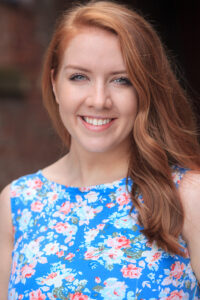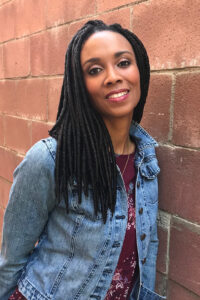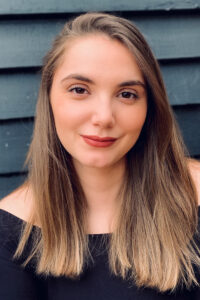Four former BAST students reveal how singing teacher training gave them the tools and confidence to coach others and build successful businesses.
Cat Ogden runs a vocal practice in Cheshire and is studying for her Masters in Voice Pedagogy.
What was your background before you signed up to BAST Training?
I have an undergraduate degree in Music Theatre. After university, I became a function singer while auditioning and teaching singing. I got to the grand final of the UK Open Mic Singing Competition back in 2016, which was an amazing journey. I taught singing for five years before signing up for the BAST Training course.
Why did you seek out singing teacher training?
While at university, I was introduced to aspects of voice science, and this led me to want to become a singing teacher. But I felt I had no additional training to help me provide students with relevant, up-to-date knowledge and research on the voice. I spoke to a fellow singing teacher, and she recommended BAST Training to me.
What did you find most useful about the course?
What didn’t I find useful? Being able to apply what I was learning straight into my teaching was fantastic.
What did you do after BAST?
As well as running my business from home, I am now studying a masters in Voice Pedagogy via Voiceworks UK. Doing the BAST 20-hour course has helped me get a good head start on understanding the content. I am currently doing my formative assignment, focusing on the mental health benefits of singing and group singing. It is fascinating.
Can you name your biggest challenge as a singing teacher?
Setting up firm terms and conditions and sticking by them. For example: ‘Minimum of 24 hours’ notice of cancellation. Under 24 hours’ notice still requires full payment’. When a parent or a student cancels, and I go ahead with applying this term, I always feel conflicted, especially if there is a heartfelt reason why they are cancelling. Generally, I end up offering to make up this lesson anyway but insisting on going ahead with payment.
What surprised you most about your early teaching experiences?
How much joy it brought me and how little it felt like a ‘job’. I struggled through school with complicated home circumstances. Between the ages of seven and 13, I lived in 11 different places. I went to eight schools and achieved modest results. But the voice, or anything to do with performing arts and the arts in general, fascinates me. I love learning about the voice, and I’m always hungry for more information, more training and better understanding.
What advice would you give someone studying with BAST Training?
Embrace it all! Don’t be afraid to ask questions. Keep notes, keep learning and enjoy!
What’s next for you professionally?
When I complete my Masters in Voice Pedagogy, I hope to teach the voice at university. I am also interested in the mental health benefits of singing and wish to delve into this more in my professional future.
Website: catogdensinging.com
LA-based Jamila Ford is a singer, vocal coach and host of The Working Singer podcast, a chat show about career singers.
What was your background before you signed up to BAST Training?
At university, I majored in Music with a BA in vocal performance. As a pro singer, I did session work, sang backing vocals for several local artists and toured internationally with a major jazz artist. I have written and released four independent records.
Why did you seek out singing teacher training?
I wanted to teach, but I had a lot of fear around it. My early attempts were incredibly awkward. I tried teaching once years ago and didn’t feel like I knew what I was doing. I stopped and didn’t try again for many years.
What did you find most useful about the course?
The course demystified the process of teaching and gave me a clear idea of what I needed to know and what I should expect. I found the introduction to vocal anatomy so useful and appreciated being encouraged to teach as we learn.
What did you do after completing the course?
I’ve continued teaching and am finding my footing as a teacher. I have some students and am building my roster. I feel much more confident moving forward and continue to study.
Can you name your biggest challenge as a singing teacher?
My most challenging students have had issues finding pitch and connecting with the melody they’re singing. Getting into ear training with students is a fun challenge, and it’s very rewarding when they make progress.
What surprised you most about your early teaching experiences?
I was surprised by just how dynamic it can be. It can be very emotional for students when they have a breakthrough. I don’t attempt to play psychologist with my students, but singing is an emotional endeavour. As teachers, we need to be sensitive to students’ feelings and careful about the way we word things.
What advice would you give someone studying with BAST Training?
Teach as you go. Use the information you’re learning right away.
What’s next for you professionally?
I am going to continue to learn and grow as a vocal coach, build my studio and contribute as much as I can to the singer community.
Website: jamilaford.com
Mike Roberts is a lecturer in Music Performance and Production at LIPA Sixth Form College in Liverpool.
What was your background before you studied with BAST Training?
I was a college lecturer in Music Performance and Production and had a great deal of experience in the instrumental side of music performance but no formal voice education. I had been a high-end function band musician and manager for over 10 years; playing the bass guitar, singing backing vocals and the occasional lead vocal. I also studied Music Technology as an undergraduate and completed an MA in Music Production.
Why did you seek out singing teacher training?
I was working with singers who I could hear needed to improve, but I didn’t have the vocabulary or knowledge to help them. I wanted to be able to instruct and develop them as comprehensively as I could do with the instrumental students.
What was most useful about the course?
The most useful thing was learning how to diagnose what was happening with different voices and recommend exercises to remedy and improve the voice. It was also fascinating to understand the anatomy behind how we produce the sound – this helped me grasp why problems occur in the first place and why these exercises help.
What did you do after completing the course?
I’ve continued to teach in college, where my confidence in working with singers has increased tenfold.
Can you name your biggest challenge as a singing teacher?
Covid-19. At first, it was a colossal challenge to continue to create engaging and educational lessons. However, as time moves on, I have found I can spend more one-on-one time with my vocalists (via online software). I’ve had the time to take them through exercises and how to improve their vocals using what I learned on the course, which has been great.
What surprised you most about your early experiences as a singing teacher?
I feared that away from the course, I would not be able to pick up the tells and signs that Line Hilton [BAST trainer] had outlined. However, I found myself diagnosing students’ vocals straightaway with newfound confidence.
What advice would you give someone studying with BAST?
The BAST course is brilliant, but there is a lot of useful information to take in. Video or audio-record the course, so you can go back and listen afterwards.
What’s next for you professionally?
I’m toying with the idea of teaching on the side; doing some private performance coaching sessions on audition technique and holistic performance.
Contact Mike on LinkedIn.
Jacinda Palmer signed up to BAST Training to increase her knowledge of vocal technique and now plans to open a studio.
What was your background before you studied with BAST Training?
I studied a BMus degree in Professional Music Performance Vocals at ACM. I was very much focused on being a solo artist and never thought about going into teaching. Then a few years back, a performing arts company got in contact with me and asked if I would be interested in being a vocal coach for them.
Why did you seek out singing teacher training?
After a year of teaching, I knew I needed to expand my knowledge and teaching methods. My teaching was mainly focused on performance skills as I only had a basic understanding of vocal technique. I realised that I needed to learn as much as possible about the voice and how it works to maintain a high standard.
What did you find most useful about the course?
The pop quizzes were great. It’s been nearly a year since I completed the course and I still use my notes as a reference.
What did you do after completing the course?
I work for two companies and teach individual one-to-one lessons and group lessons.
Can you name your biggest challenge as a singing teacher?
When a student asks you a question, and you don’t know the answer! I am honest and say I don’t know and that I will find out for them.
What surprised you most about your early experiences as a singing teacher?
You can’t be shy as a teacher. You are the leader, especially if you are teaching groups.
What advice would you give someone studying with BAST Training?
Make sure you watch the recordings of the sessions because there is a lot of information to take in.
What’s next for you professionally?
Opening up my teaching studio, joining Vocology in Practice as an authorised ViP professional and writing my songs and performing as a solo artist.
If you’d like to learn how to turn your passion for singing into a successful career as a teacher, sign up to our free masterclass taking place on Thursday, July 30 at 6.30 pm. Veteran vocal coach and BAST founder Line Hilton will explain what it takes to find success as a singing teacher.








